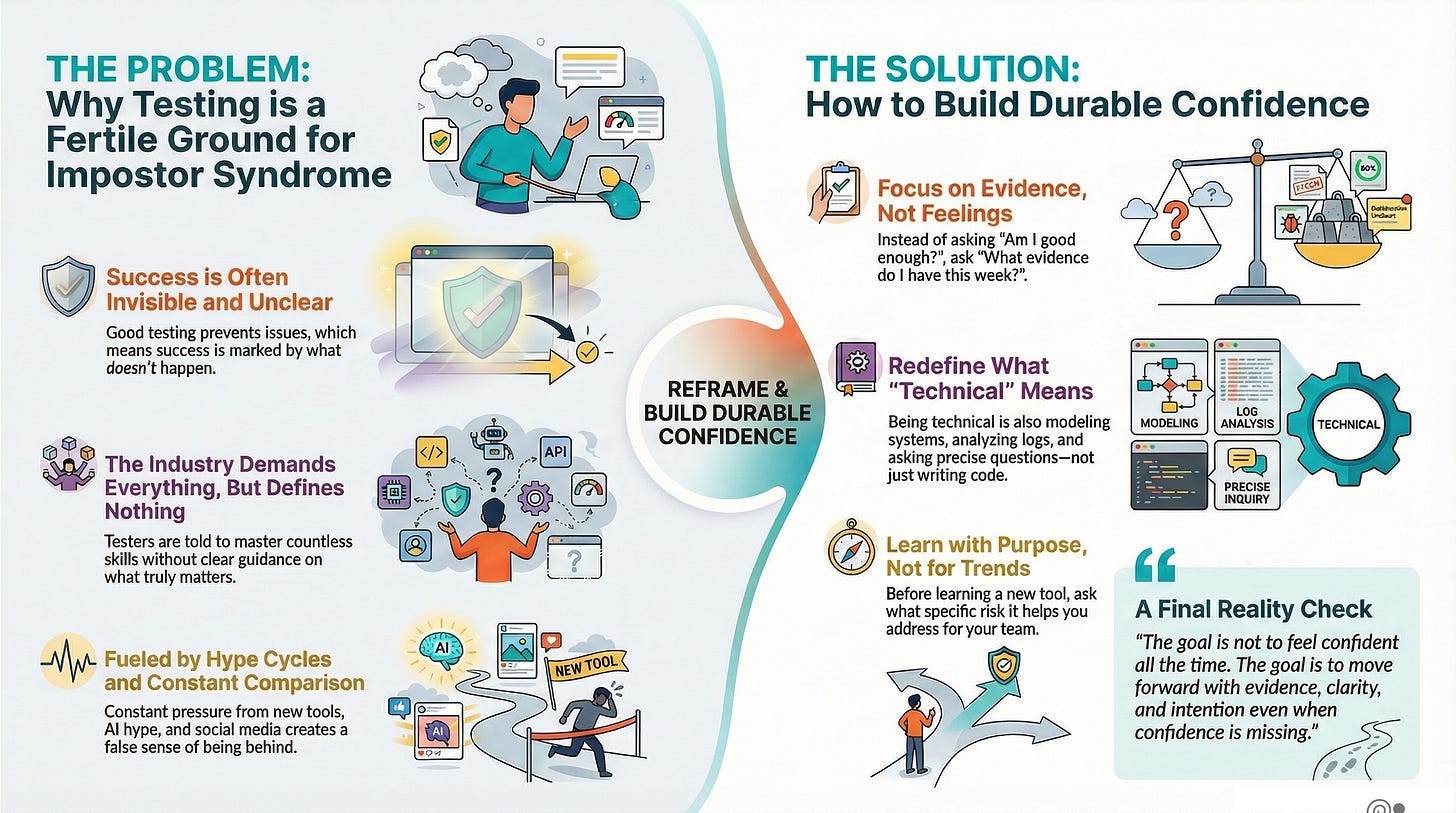🎭 Overcoming Impostor Syndrome in Software Testing
A Reality Check for Test Engineers

Impostor syndrome is not a motivational problem. It is a signal.
It is your brain reacting to uncertainty, shifting expectations, noisy comparisons, and poorly defined standards of success. In software testing, it shows up more often than people admit because testing itself lives in ambiguity. There is no final “correct” answer. There is only better or worse information.
Many testers quietly feel like they are pretending. They fear being exposed as “not technical enough,” “not smart enough,” or “not advanced enough.” The industry’s obsession with tools, titles, and trends makes that feeling worse. Every month there’s a new framework, a new AI tool, a new hype cycle telling you what you should already know.
Let’s deal with this honestly.
Impostor syndrome in testing is not solved by confidence quotes or pretending to be fearless. It is solved by understanding what testing really is and by building real evidence of your value.
Why Impostor Syndrome Hits Testers Hard
Impostor syndrome thrives in environments where:
• The rules of success are unclear
• Effort is invisible
• Learning never ends
• Comparison is constant
• Failure is public
Software testing checks every one of these boxes.
Unlike developers, testers are rarely measured by output that looks impressive on the surface. Good testing often means nothing happened. No outage. No incident. No headline. That invisibility feeds doubt.
Add to that:
• Job titles that change every year
• Automation pressure
• AI hype
• Tool-driven hiring
• Social media “10x tester” nonsense
And suddenly many capable testers start believing they are behind, even when they are doing solid work.
The Real Root of Impostor Syndrome
(Not the One LinkedIn Sells You)
Impostor syndrome doesn’t come from ignorance alone. It comes from mismatched expectations.
You are told:
You must master automation
You must understand cloud
You must know AI
You must code
You must do performance
You must do security
You must do everything
No one tells you:
What level is enough
What actually matters for your context
What trade-offs you are allowed to make
So you chase breadth without depth, fear without clarity, and learning without direction. That is not growth. That is anxiety disguised as ambition.
The Day Your Impostor Story Changes
Almost every tester I trust has a moment like this:
They face something unfamiliar.
They doubt themselves.
They struggle publicly.
They get help.
They still deliver.
That moment teaches something powerful:
You don’t need to “already be ready.”
You just need to be willing to be seen learning.
Competence is built in motion, not in hiding.
What Actually Kills Impostor Syndrome
(Not Confidence. Not Motivation.)
1. Evidence, Not Identity
Stop asking:
“Am I good enough?”
Start asking:
“What evidence do I have this week?”
Evidence looks like:
A risk you uncovered
A production issue you prevented
A question that changed a decision
A scenario you modeled that others missed
A bug that changed behavior, not just status
Confidence without evidence is fragile. Evidence builds quiet, durable confidence.
2. Replace Comparison With Context
You are not competing with:
Influencers
Conference speakers
Tool marketers
You are serving:
Your product
Your users
Your team
If your testing improves decision-making in your context, you are already valuable. Not global. Not trending. Valuable where it counts.
3. Learn in Service of Problems, Not Trends
Learning everything is impossible. Learning what your system demands is essential.
Before learning any tool or concept, ask:
What risk does this help me see?
What decision does this improve?
What failure does this prevent?
Noise learning grows impostor syndrome. Purposeful learning shrinks it.
4. Redefine What “Technical” Means
Being technical is not just:
Writing code
Creating frameworks
Automating flows
Being technical can also mean:
Modeling system behavior
Understanding failure modes
Analyzing logs and data
Asking precise questions
Mapping business risk to technical impact
If you can influence technical decisions with clarity and evidence, you are technical. Even if you never touch a CI pipeline.
5. Normalize Public Learning
Impostor syndrome thrives in silence.
Talk about:
What confused you this week
What you misunderstood
What you learned late
What you changed your mind about
Strong testers do not pretend to know. They make learning visible and safe.
A Truth Most Articles Avoid
Sometimes impostor syndrome is not a mindset issue.
Sometimes you are:
Underpaid
Under-recognized
Overloaded
Managed poorly
Placed in a toxic comparison culture
In those cases, the problem is not inside you. It is structural. No amount of positive thinking fixes a broken environment. The fix is negotiation, boundary setting, role change, or leaving.
Final Reality Check
Impostor syndrome does not disappear forever.
It fades, returns, and reshapes itself as you grow.
That does not mean you are weak.
It means you are stretching into new territory.
The goal is not to feel confident all the time.
The goal is to move forward with evidence, clarity, and intention even when confidence is missing.
That is what real professionals do.
If you found this helpful, stay connected with Life of QA for more real-world testing experiences, tips, and lessons from the journey!



Well explained. 👍👏